Allergy Therapeutics plc (LON:AGY), the fully integrated commercial biotechnology company specialising in allergy immunotherapy, today announced its unaudited interim results for the six months ended 31 December 2019.
Highlights
Financial highlights
- Revenue increased by 9% at constant rate* and 8% in actual terms to £50.5m (H1 2019: £46.7m)
- 10% growth in pre-R&D operating profit to £17.3m (H1 2019: £15.7m) largely as a result of continued sales growth
- Operating profit pre R&D margin of 34% (H1 2019 34%)
- R&D expenditure lower at £1.3m (H1 2019: £5.0m) due to receipt of Inflamax legal costs (£3.2m)
- Strong cash balance of £39.7m (30 June 2019: £27.4m)
Operational highlights
- Good growth across all key products in the portfolio with small increase in market share in European business
- First stage of Grass MATA MPL Phase III programme to start in H2 2020 in EU and USA
- Preclinical VLP Peanut data published in highly respected journal post period end
Manuel Llobet, CEO at Allergy Therapeutics, stated: “The Group has made a steady start to the year with good sales growth supporting our strategy. The regulatory environment remains uncertain but we continue to perform well commercially and to progress our high potential pipeline.”
*Constant currency uses prior year weighted average exchange rates to translate current year foreign currency denominated revenue to give a year on year comparison excluding the effects of foreign exchange movements. See table in finance review for an analysis of revenue.
Joint Statement from the Chairman and Chief Executive Officer
Operating Review
Overview
The Group performed well in a challenging market and continued to drive growth in operating profit before R&D (10% up on 2019). There has been increased regulatory activity across Europe in the period creating uncertainty in the market. The growth achieved in the last six months highlights the quality and convenience of our products, our robust supply chain and strong marketing and sales team.
The Market
Allergy Therapeutics achieved sales growth in constant terms1 of 9% (8% at actual rates). This growth came from across the portfolio with particularly strong performances by Pollinex, Venomil and Pollinex Quattro. The strong 2019 tree season has driven a strong demand for our tree allergy products while the grass season was less pronounced.
We have seen a strong performance in H1 2020 from Germany, Spain, Netherlands and Switzerland, driven by improved market positions, promotion of our ultra-short course products and more focus on key products in the portfolio. The market is generally becoming more aware of the importance of data-driven products, which benefits the Group’s products which use advanced science and technology to validate performance.
Regulatory Affairs & Clinical Development
The first half of FY 2020 has been a very busy time for the clinical team with the analysis of the Birch MATA MPL Phase III (B301) trial results leading to a revised approach to the Grass MATA MPL trial. The upcoming Grass development study will now take a stepwise approach, with two stages covering both the 2021 and 2022 pollen seasons. The stepwise approach has been designed with input from regulatory consultants. It enables a phase III-scale development to begin in 2020 and includes a data review to gain insights into the trial, before continuing to the second part of the Phase III development. The first stage of the Grass MATA MPL phase III programme will start in the autumn of this year with read out in 2021.
A significant amount of work has been carried out by the Group in relation to the German TAV (Therapy Allergy Ordinance) process and the products that are part of that process. The German TAV process is in response to EU legislation relating to named patient products which requires immunotherapies to the most common allergens to undergo a market authorisation process. This is also starting to apply to the Italian and Spanish markets and is likely, in time, to affect the whole EU market. Further trials are not expected to be needed for each additional country.
The Group is in dialogue with the German regulatory authorities about the results of the Birch MATA MPL Phase III trial. The team will focus first on applying the lessons to the Grass MATA MPL trials before returning to a further clinical trial in relation to Birch.
The Group announced the publication, in January 2020, of encouraging preclinical results of its peanut allergy vaccine candidate in The Journal of Allergy and Clinical Immunology (JACI), the most frequently cited allergy and immunology journal in the field.
The study, which used the Group’s novel virus like particle (VLP) platform, potentially offers an effective way to treat peanut allergies and prevent anaphylaxis. It provided validation of proof of concept for the generation of sustained immunity and protection through vaccination. The study illustrated that a single injection protected against systemic anaphylaxis, as demonstrated via subsequent in vivo challenge, skin prick testing and oral challenge.
1Constant currency uses prior year weighted average exchange rates to translate current year foreign currency denominated revenue to give a year on year comparison excluding the effects of foreign exchange movements. See table in finance review for an analysis of revenue.
With manufacturing scale-up of the product now underway and following agreement with several regulatory authorities on the clinical trial design, the programme to initiate first-in-human studies is progressing well. Given the importance of the trial and scale of the opportunity, the Group is implementing robust protocols with the regulatory authorities and plans to introduce additional in vitro human cell testing to its preclinical programme to ensure the initial studies will support global registration plans. Submission of the clinical trial application is anticipated in 2021.
The Group is evaluating further opportunities in the immunology field that could utilise VLP technology alongside the adjuvant systems that the Group owns.
Financial Review
Reported revenues for the first half of the financial year were £50.5m (H1 2019: £46.7m), representing a growth of 9% at constant currency (see table below) and 8% in actual terms. The sales growth has been driven primarily by the Group’s investment in marketing and sales teams and broadening of the product portfolio as it continues to increase its market share in all of its main markets. Rebates were higher this period due to increased sales and price rises of certain products.
A reconciliation between reported revenues and revenues in constant currency1 is provided in the table below:
| 6 months to | 6 months to | Increase | Increase | |
| 31-Dec-19 | 31-Dec-18 | |||
| £m | £m | £m | % | |
| Revenue | 50.5 | 46.7 | 3.8 | 8.1% |
| Adjustment to retranslate to prior year foreign exchange rate | 0.3 | – | 0.3 | |
| Revenue at constant currency1 | 50.8 | 46.7 | 4.1 | 8.8% |
| Add rebates at constant currency | 3.3 | 2.4 | 0.9 | |
| Gross revenue at constant currency | 54.1 | 49.1 | 5.0 | 10.2% |
As in previous years, owing to the seasonality of the pollen allergy market, between 60% to 70% of Allergy Therapeutics’ revenues are generated in the first half of the financial year and, as a consequence, the Group typically reports profits in the first half of the year and losses in the second half.
Cost of goods sold increased in the period to £11.4m (H1 2019: £9.4m), mainly due to higher volumes being sold, Brexit costs and reversal of stock provisions in the prior year. Gross profit increased to £39.1m (H1 2019: £37.3m), which represents a gross margin of 77% (H1 2019: 80%).
Sales, marketing and distribution costs of £13.6m (H1 2019: £13.6m) were in line with the previous period. Administration expenses of £8.2m (H1 2019: £8.1m) were broadly in line with the previous period.
Research and development costs of £1.3m (H1 2019: £5.0m) reflected the lower level of activity in H1 2020 with the key Grass MATA MPL trials starting in autumn 2020 and included the £3.2m received in settlement of legal costs relating to the litigation with Inflamax.
The tax charge in the period of £0.6m (H1 2019: £0.4m) relates to overseas subsidiaries. It should be noted that IFRIC 23 (Uncertainty over income tax treatment) has been implemented in the period ended 31 December 2019. The Group prepares provisions against uncertain tax positions in accordance with IFRIC 23. IFRIC 23 has been adopted by the Group with effect from 1 July 2019, with the modified retrospective approach being applied (i.e. the cumulative effect of initially applying the Interpretation is recognised as an adjustment to the opening balance of retained earnings, with no change being made to the prior year comparative numbers).
The effect of IFRIC 23 provisions in these interim financial statements amounts to £0.7m and this has been dealt with through retained earnings.
Property, plant and equipment excluding IFRS16 increased by £1.3m to £11.3m compared to the year before, mainly as a result of investment in new storage facilities as part of our Brexit contingency planning. IFRS16 additions amounted to £9m and depreciation of £0.7m. Goodwill was £3.3m (H1 2019: £3.4m) and was lower than the prior year due to changes in the foreign exchange rates. Other intangible assets have decreased by £0.2m due to the amortisation charge being in excess of additions.
Total current assets excluding cash have decreased by £1.6m to £17.8m (H1 2019: £19.4m) mainly due to a reduction in debtor days.
Retirement benefit obligations, which relate solely to the German pension scheme, increased to £12.3m (H1 2019: £10.5m) due to a decrease in the discount rate primarily as a result of lower corporate bond yields in Germany.
Net cash generated by operations was strongly positive, due to lower R&D spending in the first half of the year 2020 as well as the strong trading result, with an inflow of £14.3m (H1 2019: £6.8m).
It should be noted that the financial results for H1 2020 now incorporate IFRS16, the new accounting standard on leased assets. This requires companies reporting under International Accounting Standards to place operating lease assets on the balance sheet with an accompanying liability. Furthermore, depreciation is charged on these assets (£0.7m) as well as a finance charge (£0.2m) with removal of lease charges (£0.9m). The impact of this is that lease costs in the P&L reduce and depreciation increases. Hence, the measure of earnings before interest, tax and depreciation and amortisation has benefited to the order of £0.9m. There is no material impact on the operating profit.
Financing
The Group had cash of £39.7m (30 June 2019 £27.4m) and debt on its balance sheet at the close of the period relating to loans held in the Spanish subsidiary of £2.0m (H1 2019: £2.8m). The seasonal overdraft was not used during the calendar year 2019 but the Group expects to renew its banking facilities when they are due for review in August 2020.
The Directors believe that the Group will have sufficient facilities for the foreseeable future and, accordingly, they have applied the going concern principle in preparing these interim financial statements.
Movements in the currency markets between the respective values of the euro and sterling have an effect on the Group’s operations. The Group manages its cash exposure in this respect by foreign currency hedges. Over 90% of our gross sales are denominated in euros whereas approximately 60% of costs are incurred in the United Kingdom and denominated in sterling.
Outlook
This calendar year is key in order to prepare for several important trials for the 2021 financial year.
The Board and management team expect that net sales will continue to grow in line with market expectations in the second half of the year and have confidence in the future of the business. The gross margin is expected to be lower in the second half of the year compared with the first, as volumes through the factory are likely to be lower, leaving gross margin for the whole year in line with last year. As planned, research and development costs, excluding the Inflamax legal cost recovery, are expected to double in the second half of the year compared with the first half, reflecting the period of higher activity of the Grass MATA MPL trial and further work on peanut study as well as TAV costs. Other costs for the full year are expected to be in line with market expectations due to phasing and Brexit.
As noted in the Group Risks section of the 2019 Annual Report, management has taken action to try to mitigate the impact of Brexit. It will be difficult to determine precisely what impact Brexit will have on the business until a trade deal is concluded.
The Group continues to grow well while developing a very exciting and valuable pipeline of products.
The regulatory environment is a challenge but the Group is best placed to meet it with its strong portfolio of products and high potential pipeline.
Peter Jensen
Chairman
Manuel Llobet
Allergy Therapeutics plc Chief Executive Officer







































